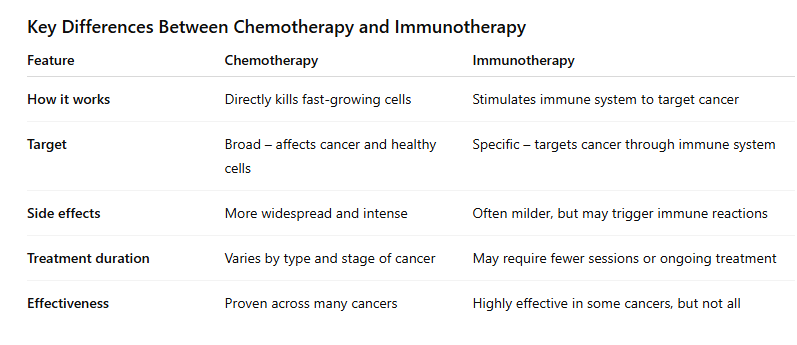Immunotherapy vs. Chemotherapy: What’s the Difference and Why It Matters in Cancer Treatment
When it comes to cancer treatment, most people are familiar with chemotherapy—a long-standing and widely used approach. But in recent years, a groundbreaking new treatment called immunotherapy has emerged, offering new hope for patients with certain types of cancer.
So, how exactly do chemotherapy and immunotherapy differ? Let’s break it down.
What Is Chemotherapy?
Chemotherapy uses powerful drugs to kill cancer cells. These drugs travel throughout the body and target rapidly dividing cells, which includes not just cancer cells, but also some healthy cells like those in the hair follicles, digestive tract, and bone marrow.
This is why common side effects include:
Hair loss
Fatigue
Nausea
Weakened immune system
Chemotherapy is often used to shrink tumors before surgery, destroy remaining cancer cells after surgery, or treat cancer that has spread.
What Is Immunotherapy?
Immunotherapy takes a very different approach. Instead of attacking cancer cells directly, it stimulates the body’s immune system to recognize and destroy cancer cells on its own.
There are several types of immunotherapy, including:
Checkpoint inhibitors: Help immune cells recognize and attack cancer
CAR T-cell therapy: Reprograms a patient’s own T cells to target cancer
Cancer vaccines and monoclonal antibodies: Boost immune response
Immunotherapy tends to be more targeted than chemotherapy and may have fewer side effects, though it’s not necessarily easier for everyone. Common side effects can include fatigue, inflammation, or flu-like symptoms—sometimes even an overactive immune response.
Can Chemotherapy and Immunotherapy Be Used Together?
Yes! In some cases, doctors combine chemotherapy and immunotherapy to enhance results. Chemotherapy can reduce tumor size or suppress the cancer enough to help the immune system mount a stronger response once immunotherapy kicks in. This combination is becoming more common, especially in treating cancers like lung cancer and melanoma.
Which Treatment Is Right for You?
There’s no one-size-fits-all answer. Factors that influence treatment decisions include:
Type and stage of cancer
Genetic and molecular makeup of the tumor
Overall health and treatment goals
Access to clinical trials
A cancer care team will tailor a plan based on your specific needs. It’s important to discuss both risks and benefits with your oncologist and explore all available options.
The Bottom Line
Both chemotherapy and immunotherapy are powerful tools in the fight against cancer—each with its own advantages and limitations. While chemotherapy attacks cancer cells head-on, immunotherapy empowers your body to do the work. The future of cancer care will likely continue to blend these approaches, offering more personalized, effective treatments than ever before.
If you or a loved one is navigating a cancer diagnosis, staying informed about evolving treatment options can be a crucial step in the journey toward healing.
References
For more information on how HuMOLYTE can support your gut health during chemotherapy, visit our product page or consult your health care provider.
This blog was reviewed by Dr. Sourabh Kharait.
This blog is for educational purposes only and is not intended as medical advice. Always consult with your healthcare provider before making any changes to your treatment plan, hydration strategies, or diet. The information provided here is based on general insights and may not apply to individual circumstances.

